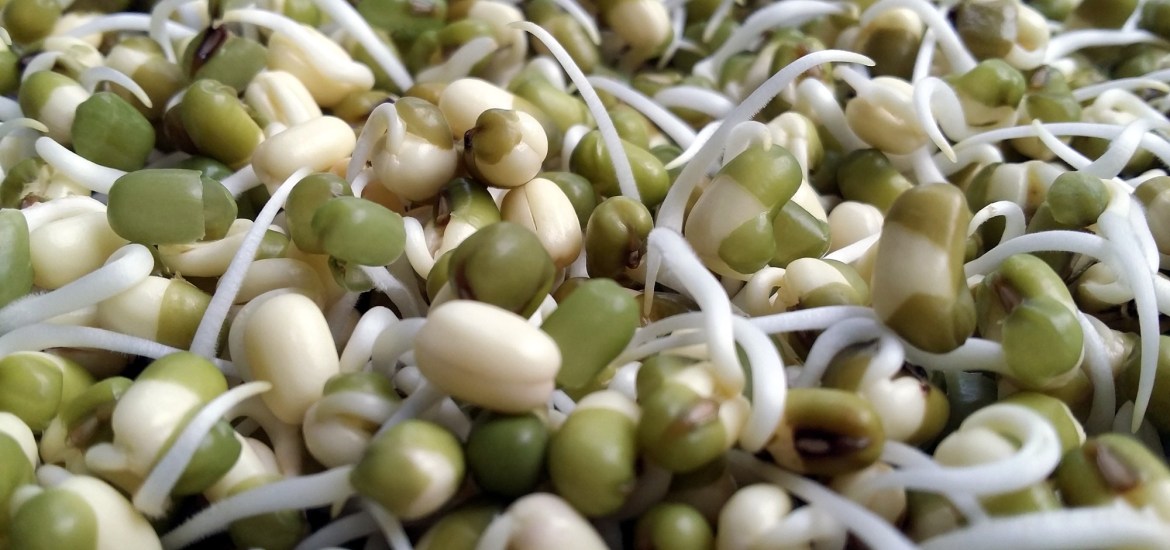
How to grow sprouts at home PLUS their amazing health benefits!
Seeds, sprouts, microgreens: how to grow sprouts at home and introduce them into your diet
For some, sprouting seeds at home seems like a foreign concept, reserved for seasoned horticulturists or those gifted with green fingers. The truth is that ANYBODY can start their very own kitchen garden, having no previous experience, minimal equipment and very little space! You may be interested in sprouting your own seeds due to the recent trends of consuming microgreens or simply because it's much more affordable than buying greens from your local grocer!
Whatever the reason for wanting to start sprouting your own seeds, we're going to push you in the right direction! Here are our top tips on how to grow your own sprouts at home plus the incredible health benefits!
(View our collection of non-GMO, organic sprouting seeds)
What does it mean to sprout your own seeds?
The definition of sprouting, as explained by www.draxe.com, is as follows: "Sprouting is essentially the practice of germinating seeds — whether grains, nuts, beans, legumes or other kinds of seeds — so they are easier to digest and your body can access their full nutritional profile."
Benefits of sprouting your own seeds:
Sprouts are something that anybody can (and should) grow. People have sprouted seeds, nuts, grains and beans for thousands of years! Our ancestors understood the benefits of incorporating sprouts, microgreens and mature greens into our diet, including the advantages that they provide to our health and well-being! Listed below are the various benefits of growing and consuming your own sprouts.
1) Quick and easy
Sprouts are one of the easiest foods that you can grow in the comfort of your own kitchen! If you can fit a jar on your counter, you're all set to go - you don't need much space. Additionally, it takes surprisingly fast for your seeds to sprout, sometimes as quick as 4 days!
2) Affordable
It's much more affordable to grow your own sprouts and greens at home, than constantly stocking up from grocery stores. In fact, your initial lay-out is also very affordable, as a pack of seeds isn't expensive, and will provide you with much more value for money than from stores.
(View our collection of non-GMO, organic sprouting seeds)
3) Sprouts are potent nutritional sources
While seeds hold nutritional value, it's common that consumption of these seeds can lead to indigestion and autoimmune reactions. The reason for this is that our bodies cannot absorb the nutrients or break down the antinutrients (naturally-occurring substances found in plant-derived foods that interfere with the absorption of nutrients and minerals) found in unsprouted seeds. In fact, eating unsprouted seeds regularly can have a damaging effect on your health!
Once again, we've pulled a quote from www.draxe.com that explains why seeds contain antinutrients: "Antinutrients actually have a protective property within plants. They help plants survive by warding off pests and insects. Once they’re ingested, the plant’s predators become somewhat sick. Antinutrients also have the job of keeping a seed from sprouting until it’s ripe enough and ready to mature."
The good news is that sprouting and soaking seeds break down antinutrients, make the seeds more digestible and amplify the potency of nutrients contained within! Vitamins, minerals, protein, fibre and other valuable compounds of the seeds become more available once the seed has sprouted, and are easily absorbed and utilised by the human body.
4) Microgreens are awesome
Microgreens are young vegetable greens that are approximately 1–3 inches (2.5–7.5 cm) tall. They are the growth phase that comes after the sprout and before the baby greens, and are used widely in many dishes. While they are small in size, they actually offer more nutritional value than mature greens, and often offer a lot more flavour!
The difference between sprouts and microgreens is that sprouts do not have any leaves, while small, primary leaves are evident on the microgreens. The similarity between the two is that they both offer powerful nutritional value! Sprouts and microgreens have the highest concentration of nutrients per calorie of any food!
5) Better for the environment
Growing your own food at home reduces your carbon footprint, mass-consumerism and conventional farming! How? If you rely on grocery stores to bring food to your plate, there are many components involved in the production/distribution process that impact the environment.
The mere act of transporting fresh produce from farms to grocery stores, which takes place on a huge scale daily, relies heavily on the energy from burning fossil fuels. The toxic waste emitted from these non-reusable fossil fuels takes a large toll on wildlife, communities and the environment. Another factor to consider is the use of pesticides and synthetic fertilizers and genetically modified organisms with conventionally grown crops. If you're growing your own non-GMO and organic seeds, you know exactly what goes into them and what doesn't!
Where can you get sprouting seeds?
It's best to purchase seeds from a trusted source, where you know that the seeds are non-GMO and organic. Many foods that have been imported from other countries have been irradiated to stop them from sprouting before they arrive at the grocery store. Health stores usually have a small selection of non-GMO, organic seeds, or you can browse a wide variety of seeds and sprouting kits HERE to order online.
How to grow sprouting seeds at home:
If you have any question, please contact us for FREE advice from our team. We're always happy to hear from you!



Leave a comment